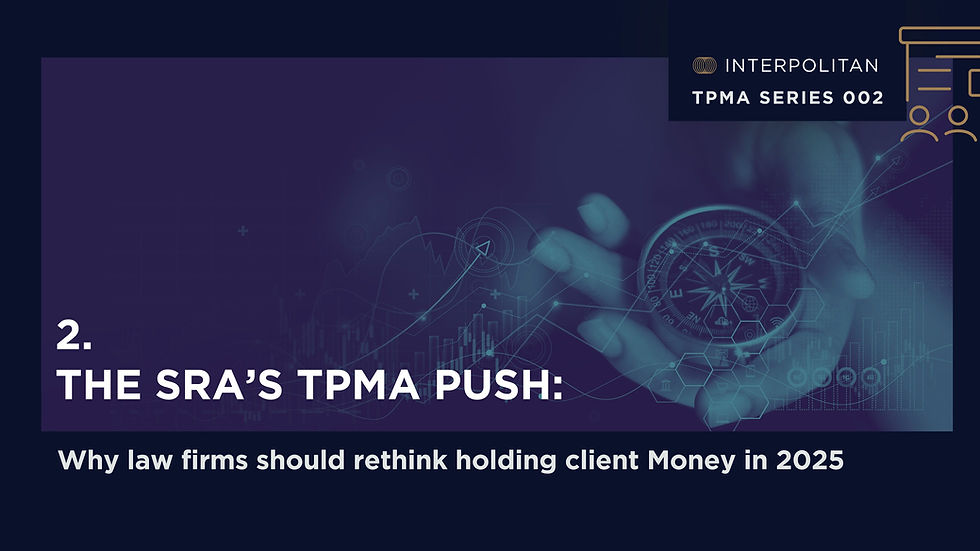The SRA’s TPMA Push: Why Law Firms Should Rethink Holding Client Money in 2025
- Jon East

- Aug 6, 2025
- 3 min read
Updated: Aug 7, 2025

Beyond Client Accounts: The Future of Fund Management in Legal Services. An Interpolitan Money mini-series for law firms, private client teams, and regulated professionals.
 Written by Jon East |  Contributor Daniel Dunne | Latest edited Aug 2025 5 min read. |
Table of contents
Welcome to the second instalment of our mini five part series on Third Party Managed Account.
Introduction
For decades, solicitors have managed client money through in-house accounts. But that tradition is under serious review.
In 2025, the Solicitors Regulation Authority (SRA) is no longer just permitting the use of Third Party Managed Accounts (TPMAs); it’s signalling that they could become the default.
As trust in traditional models’ wanes, a new era of regulated, risk-managed, and transparent fund handling is emerging.
SRA Accounts Rule 11: The Gateway to Change
The SRA currently allows the use of TPMAs under Rule 11 of the SRA Accounts Rules. While still optional, the tone of recent consultations suggests a future where holding client money could be phased out for most firms.
In their words:
“We are exploring whether more could be done to reduce risk around the holding of client money, this could include moving away from client accounts altogether.” — SRA Consultation on Holding Client Money, 2024
The Legal Services Consumer Panel’s View
The LSCP, an independent watchdog advising the Legal Services Board, issued a stark warning in 2024:
“We have no confidence that the current framework adequately safeguards client money.”
Their preferred solution?
“Mandate the use of Third Party Managed Accounts. Prohibit firms from holding client funds.”
They also noted that TPMAs could increase public trust and reduce the risk of firm collapses due to fund misuse.
So What Happens if Client Accounts Are Banned?
Firms will need to:
Appoint an FCA-regulated TPMA provider
Remove infrastructure for managing client funds internally
Adjust workflows for payments, invoicing, and disbursements
Educate clients on the improved security and transparency
Adapt to more auditable, regulated financial flows
FCA Oversight = Added Confidence
Unlike law firms, TPMA providers are held to FCA safeguarding, capital, and operational resilience standards.
Client funds are ring-fenced and not on balance sheet
CASS 7.14 requires segregation and real-time reconciliation
Ongoing compliance reviews and insurance coverage add layers of protection
Key Benefits of Switching to a TPMA Now
Regulatory readiness
TPMA providers, regulated by the FCA, are the only authorised parties who can hold and disburse the funds—law firms cannot access the money directly.
Reputation management
Proactively adopting a best-practice model sends a strong message to clients and referrers.
Risk reduction
TPMAs eliminate internal fraud or error by removing client money from the firm’s control.
Cost neutrality
Many TPMA providers charge per transaction, not based on balances, no float required, and no reconciliation admin.
Real-World Case Studies: Misappropriation & Risk in Legal Client Accounts - Liaqat Ali / BK Solicitors (2025) £1.1 million processed through defunct client account
What happened: Liaqat Ali, a solicitor, used the client account of a closed firm (BK Solicitors) to facilitate a £1.1 million property transaction nearly two years after the firm had ceased trading. This bypassed oversight and controls.
Regulatory outcome: The Solicitors Disciplinary Tribunal (SDT) struck off Ali for reckless misconduct and misuse of a client account after closure.
Relevance to TPMA: Demonstrates how dormant or unmanaged accounts can remain active and high-risk—something TPMAs prevent through third-party controls and regulated shutdown protocols.
Source: SRA Decision
Final Thoughts: Don’t Wait to Be Told
The direction of travel is clear:
Increased regulatory pressure
Reduced tolerance for mishandling client funds
Clear support for FCA-regulated alternatives
By switching to a TPMA model now, firms gain control over their future and their reputation before new rules make the decision for them.
“The SRA has opened the door to TPMAs. The only question is: will you walk through it before you’re pushed?” — “Waiting for a regulation to change isn’t a strategy, it’s a risk.” — Interpolitan Money - Head of Legal Services - Daniel Dunne
Ready to Protect Your Clients and Your Firm?
Interpolitan provides fully aligned FCA-regulated TPMA services for legal professionals across the UK and internationally. We help mitigate risk, simplify compliance, and future-proof your operations.
Next in our series:











Comments